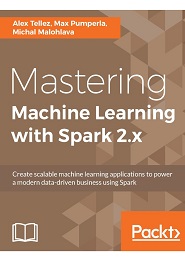
English | 2017 | ISBN: 978-1785283451 | 323 Pages | PDF, EPUB, AZW3 | 66 MB
Unlock the complexities of machine learning algorithms in Spark to generate useful data insights through this data analysis tutorial
The purpose of machine learning is to build systems that learn from data. Being able to understand trends and patterns in complex data is critical to success; it is one of the key strategies to unlock growth in the challenging contemporary marketplace today. With the meteoric rise of machine learning, developers are now keen on finding out how can they make their Spark applications smarter.
This book gives you access to transform data into actionable knowledge. The book commences by defining machine learning primitives by the MLlib and H2O libraries. You will learn how to use Binary classification to detect the Higgs Boson particle in the huge amount of data produced by CERN particle collider and classify daily health activities using ensemble Methods for Multi-Class Classification.
Next, you will solve a typical regression problem involving flight delay predictions and write sophisticated Spark pipelines. You will analyze Twitter data with help of the doc2vec algorithm and K-means clustering. Finally, you will build different pattern mining models using MLlib, perform complex manipulation of DataFrames using Spark and Spark SQL, and deploy your app in a Spark streaming environment.
What You Will Learn
- Use Spark streams to cluster tweets online
- Run the PageRank algorithm to compute user influence
- Perform complex manipulation of DataFrames using Spark
- Define Spark pipelines to compose individual data transformations
- Utilize generated models for off-line/on-line prediction
- Transfer the learning from an ensemble to a simpler Neural Network
- Understand basic graph properties and important graph operations
- Use GraphFrames, an extension of DataFrames to graphs, to study graphs using an elegant query language
- Use K-means algorithm to cluster movie reviews dataset
Resolve the captcha to access the links!